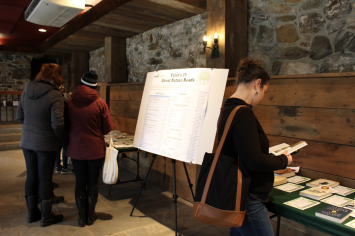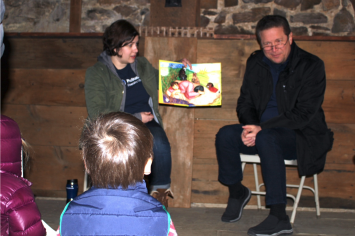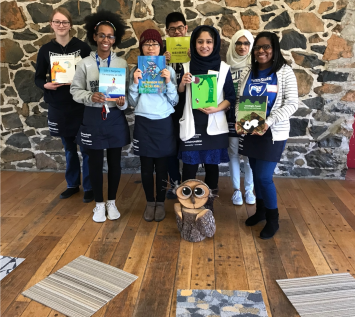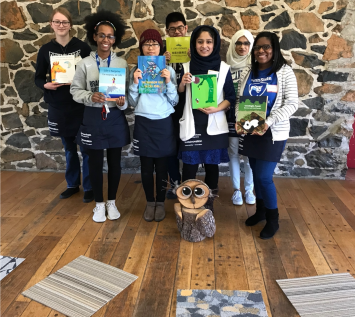Sustainability-Themed Programming Around Nature-Themed Literacy: Great Nature Reads and Multilingual Storytime
Link to the JSE General Issue May 2022 Table of Contents
Article PDF
Abstract: A partnership between a university and local arboretum was expanded to include the campus library as a collaborator. Instead of having sustainability-themed programming between the two institutions focus on just the environmental components of the Sustainable Development Goals (SDGs), a library brings attention to literacy and information access across all aspects of the partnership. We share two public programs held between our university and an arboretum with strong involvement by the library in the development and execution stages, thereby increasing the connections across the SDGs and progress towards the 2030 agenda.
Keywords: community, outreach, Sustainable Development Goals, nature, languages, storytime
Since 2017, Penn State Brandywine (PSUBW) and Tyler Arboretum have partnered on sustainability-themed programming. Through a mini-grant to the Penn State University Sustainability Institute from PepsiCo, PSUBW and Tyler started developing and offering educational STEM-themed information and hands-on activity stations at the arboretum’s annual events, citizen science days, and teacher workshops. We called the project “Sustainovation” with this term symbolizing the combination of sustainability plus innovation. Our collaborative faculty, staff, student, and community partner team framed our efforts around the land grant mission of our institution to serve the people of the Commonwealth of Pennsylvania (Mission and Values), Penn State University’s definition of sustainability (the simultaneous pursuit of human health and happiness, environmental quality and economic well-being for current and future generations) (What is Sustainability?, n.d.), and Tyler’s mission to create and inspire stewards of the natural world (Tyler Arboretum, 2021).
In the beginning of the grant period, all programming had focused on connections to the United Nations Sustainable Development Goals (SDGs) relating to protecting the planet – primarily SDG #7 (Affordable and Clean Energy), SDG #12 (Responsible Consumption and Production), SDG #13 (Climate Action), and SDG #15 (Life on Land). Although we were able to impact a large number of visitors to Tyler Arboretum at events such as their Pumpkin Days Fall Festival (see Guertin et al., 2020), we added the faculty and staff from the PSUBW campus library to the partnership to expand into the SDGs relating to reducing inequalities, especially with regard to universal literacy and information access (SDG #4 – Quality Education; SDG #16 – Peace, Justice and Strong Institutions). Libraries are viewed as playing a key role in achieving the UN 2030 goals (Wyber, 2020).
Here, we present two brief summaries of events organized by Penn State Brandywine’s Sustainovation Team and campus library that were held at Tyler Arboretum, focusing on the themes of environment and literacy. We hope those that reading about these projects consider how they might expand upon their own sustainability programming to include literacy and libraries to advance the mission of and engagement with community partners.
First Literacy Project – 75 Great Nature Reads
In 2019, Tyler Arboretum was planning a year of celebrations honoring its 75th year as an arboretum. The PSU Brandywine Sustainovation Team helped plan the first 75th anniversary kick-off event at the arboretum’s annual Pancake and Maple Sugaring Celebration held in February. To connect the SDGs addressing inequalities and the PSUBW library staff and faculty, we organized a two-stage event called 75 Great Nature Reads. We asked arboretum members to submit online descriptions of their favorite books connected to nature, along with a short description as to why these books resonated with them. The book listing with descriptions were unveiled at the February 23 Pancake and Maple Sugaring Celebration event. Our 75 Great Nature Reads anniversary celebration included a book display of some of the books purchased with grant funding, along with member descriptions and a listing of all 75 books submitted by members (the submissions included exactly 75 books that were still in print, and these were the books we listed). We created a website and handed out a bookmark where visitors could view the 75 titles of adult and youth fiction and non-fiction works: https://sites.psu.edu/tylercreative/greatnaturereads/ Some of the titles we placed on display, recommended by members of the Arboretum, included:
- Sense of Wonder by Rachel Carson
- American Chestnut: The Life, Death, and Rebirth of a Perfect Tree by Susan Freinkel
- Have You Heard the Nesting Bird? by Rita Gray
- Last Child in the Woods by Richard Louv
- Unbowed: a Memoir by Wangari Maathai
- Sophie’s Squash by Pat Zietlow Miller
- Braiding Sweetgrass: Indigenous Wisdom Scientific Knowledge and the Teachings of Plants by Robin Wall Kimmerer
- Invention of Nature: Alexander von Humboldt’s New World by Andrea Wulf
One of the PSUBW library staff was at the display to help Pennsylvania residents learn how to find electronic versions of these books through public libraries, including the availability through Penn State University’s library system. The books were donated to the arboretum after the event, which they then put on display in their visitor center and sold in their gift shop.

Figure 1. Tyler Arboretum visitors exploring the display of select books from the 75 Great Nature Reads project. In between the two table displays is a poster listing all of the book titles and authors. At the end of the table in the left of this image is a Penn State librarian reviewing with visitors how to obtain a library card and to access these books online.
To further encourage the themes of nature and literacy, we had a station for kids to color nature-themed bookmarks and a booklet with blank pages for kids to write or draw their own story. Another station at our 75 Great Nature Reads celebration was a storytime area, where one of the PSUBW librarians had the children sitting on old carpet squares on the floor in a semi-circle reading nature stories intended for young audiences. By engaging with young children through adults, our two organizations made progress in advancing SDG #4 with an inclusive activity that promoted a learning opportunity for all, and SDG #17 for facilitating both our campus and the Arboretum to be stronger together in implementing an event to advance the SDGs.
The storytime session took an unexpected turn. One of the books that the librarian brought over happened to be a dual-language book, with each page having the English text and translated Spanish text below. One of campus faculty assisting with the Great Reads Event is from Columbia with Spanish as his first language. He sat down with the librarian and the two read the book together, alternating turns to read the dual-language text on the pages. The reaction from the children and parents at the storytime was overwhelmingly positive. As Tyler Arboretum had never held a storytime event in another language, this gave us a project idea for the following year.

Figure 2. Penn State librarian Annie Jansen (left) and Professor of Engineering Dr. Ivan Esparragoza (right) reading a bilingual children’s book on birds in the rainforest during the 75 Great Nature Reads event.
Second Literacy Project – Multilingual Storytime
The following academic year, the student Sustainovation Club planned a series of sustainability-themed activities to be held at Tyler Arboretum. Interested in partnering with other clubs on campus for events, the Sustainovation Club connected with the Multicultural Student Club and combined their interests in sustainability and literacy. We focused on celebrating the annual United Nations observance of International Mother Language Day, February 21, a day that fosters multilingualism for inclusion in education and society along with the Sustainable Development Goals.
As members of both student clubs were volunteers at the 75 Great Nature Reads event at Tyler Arboretum the previous year, the clubs decided to host a multilingual storytime event for arboretum visitors in 2020 to coincide with International Mother Language Day. This event allowed our students, whose first language is not English and/or our students that are fluent in another language besides English, to represent their backgrounds and culture. PSU Brandywine does not have a large international student population, and in academic year 2019-2020, the campus had 24 international students enrolled (1.8% of total student population, from Penn State Data Digest), and we were hopeful to have a range of languages represented by our readers.
We sent out an invitation for students to participate in our multilingual storytime event through the two organizing clubs and Student Affairs listserv. We asked the campus coordinator of Multilingual and International Student Programs to share the opportunity on her listserv, as not all international students are members of the Multicultural Club. We also encouraged students who could speak English-only to participate, as we intended to pair together one student to read in English and another student to read in another language. To ensure that we had dual-language books written in the languages spoken by our students, our volunteer registration form asked students to indicate which language(s) they speak. In addition, in case we could not find a dual-language book, we asked if they could read a book written in just their spoken language without the English translation present.
Grant funding was used to purchase the dual-language nature-themed books as well as new carpet squares made of recycled fiber for the kids to sit on while the stories were being read and for Tyler Arboretum to keep and use for future events. Most of the dual-language books were found on Amazon.com, and other books were located with the assistance of the librarians. Knowing that young children may not want to sit in one place and listen to multiple books read one after another, we brought from campus the creative items popular at the 75 Great Nature Reads – blank bookmarks to color and empty booklets for kids to use stickers and stamps to create their own story.
Seven students signed up to volunteer at this Saturday-morning event at the arboretum. We were pleased to know that a few of the students spoke more than one language, and we accommodated the opportunity for students to practice and expand their spoken language skills in ten different languages. Some of the book titles we purchased included:
- The Apple Tree by Jane Thai (a dual language book – English and Mandarin Chinese)
- The Hungry Little Caterpillar/Die kleine Raupe Nimmersatt by Eric Carle (German)
- One Rainy Day/Um Dia Chuvoso by Valeri Gorbachev (a dual language book – English and Vietnamese)
- My Snow Day/Meu Dia de Neve by Ally Nathaniel (a dual language book – English and Portuguese)
- Banana for Two by Ellen Mayer (a dual language book – English and Hindi)
- Sleep Tight, Little Wolf by Barbara Brinkmann (a dual language book – English and Japanese)
- Jojo’s Playful Day/Una giornata di giochi con Jojo by Sujatha Lalgudi (a dual language book – English and Italian)
- The Rainbow Fish by Marcus Pfister (a dual language book – English and Vietnamese)
The PSUBW Strategic Communications Office attended the event to speak with Tyler visitors. The office wrote a press release (Tyson, 2020) and created a short video that was posted on social media:
If the video does not appear, it can be accessed by clicking on this link:
https://www.youtube.com/watch?v=7tiZWJQZp5E
The parents provided positive comments about the ability to have their kids exposed to a variety of languages, cultures, and people (Tyson, 2020). Our students shared with us that they “loved the initiative” and how surprised they were that even the parents were listening to the stories being read in multiple languages. As with the 75 Great Reads program, our storytime event advanced SDGs #4 and #17 and shared with an audience the opportunity, availability, and excitement of learning about nature through reading as well as listening to books being read.

Figure 3. Group photo of the student volunteers for the Multilingual Storytime Event, standing in front of the recycled carpet squares purchased and donated to Tyler Arboretum.
Programming Note and Moving Forward
The COVID-19 pandemic did not allow us to repeat the activity again in the following year, 2021. Although having a virtual storytime was an option under consideration, the Penn State Brandywine international students were located in their home countries in varying time zones, and the arboretum was not hosting any virtual youth public educational programs. We look forward to exploring and expanding upon multilingual, nature-themed events in the future when it is safe to do so.
For others looking to carry out a similar program, we were fortunate to have in place a university student organization with members who speak multiple languages, and an established community partner (Tyler Arboretum) that was seeking a way to connect with their membership. It was important to be open and share the financial capacity and technical abilities between the campus and Arboretum. Although the Arboretum did not contribute financially to our book display and reading events, they did provide the facilities, the time of their staff on weekends to host the events, and promotion of the events to their members via email and social media posts.
The university (Sustainovation Team) created the online submission form, compiled the responses, and created the website and display for the 75 great reads. In addition to ensuring that the student volunteers had transportation to the arboretum for both events, we created nametags for each student that listed the language(s) they spoke. For the storytime event, we did not anticipate the students’ requests to bring the book in their language home the night before to practice reading before being in front of the children and parents, but we certainly accommodated.
Moving forward, we would ensure the timing of our events connected to existing community events on the Arboretum’s calendar. The 75 Great Reads event took place during the second-largest event the Arboretum holds, so we were able to engage with a large audience already coming to the Arboretum that may not have been aware of the Great Reads program. The storytime event was independent of any other Arboretum activities, so the number of people we engaged with was not as large. For the storytime event, we would inform our student club much earlier (before a semester break) of the event, as several international students wished they had the opportunity to share a book from their childhood that was back home and not with them on campus. By informing students before a break, they could travel back to campus with a book.
Conclusion
Although many public programs categorized with a sustainability theme focus on the physical and natural world, the topics of information access, education, and universal literacy play an important role in accomplishing the targets outlined in the 2030 agenda. When a university hosts on-site activities or programming in the community, the library plays an important role in contributing to project, from the initial development stage to the final execution. Having people reflect upon books read in the past and expanding book engagement in the present moves our society closer to accomplishing the targets outlined in the 2030 agenda.
Acknowledgements
The authors credit the staff members of the Penn State Brandywine Sustainovation Team (R. DelViscio, I. Esparragoza, A. Showalter) for their collaboration and support. The authors wish to thank the Penn State Sustainability Institute for the awarding of a PepsiCo mini grant to fund the Great Nature Reads activity on February 23, 2019, and Multilingual Storytime activity at Tyler Arboretum on February 22, 2020.
References
Tyler Arboretum (n.d.). Tyler Arboretum Home Page. Retrieved February 12, 2021, from https://tylerarboretum.org/
Guertin, L., Theveny, K. (2020, December 20). How An Arboretum Outreach Activity Changed Students’ Attitudes Towards Sustainable Development. Journal of Sustainability Education, 24: 13 pages. http://www.susted.com/wordpress/content/how-an-arboretum-outreach-activity-changed-students-attitudes-towards-sustainable-development_2020_12/
Mission and Values (n.d.). The Pennsylvania State University. Retrieved February 12, 2021, from https://www.psu.edu/this-is-penn-state/mission-and-values/
Penn State Data Digest (n.d.) Retrieved February 12, 2021, from https://datadigest.psu.edu/dashboards/student-enrollment/campus/
Tyson, B. (2020, February 24). Brandywine celebrates International Mother Language Day with multilingual event. Penn State News. Retrieved February 12, 2021, from https://news.psu.edu/story/609460/2020/02/24/impact/brandywine-celebrates-international-mother-language-day-multilingual
What is Sustainability? (n.d.). Penn State Sustainability Institute. Retrieved February 12, 2021, from https://sustainability.psu.edu/about-us/what-is-sustainability/
Wyber, S. (2020, March 10). Libraries, Development and the United Nations 2030 Agenda. International Federation of Library Associations and Institutions (IFLA.org). Retrieved February 12, 2021, from https://www.ifla.org/libraries-development











 Laura Guertin is a Professor of Earth Science at Penn State Brandywine. She has a BA in geology from Bucknell University and a Ph.D. in marine geology and geophysics from the University of Miami/RSMAS. She is a pedagogical researcher who explores how new and emerging technologies can enhance teaching and student learning in introductory-level courses in oceanography, energy, water, and climate change. Corresponding author: guertin@psu.edu
Laura Guertin is a Professor of Earth Science at Penn State Brandywine. She has a BA in geology from Bucknell University and a Ph.D. in marine geology and geophysics from the University of Miami/RSMAS. She is a pedagogical researcher who explores how new and emerging technologies can enhance teaching and student learning in introductory-level courses in oceanography, energy, water, and climate change. Corresponding author: guertin@psu.edu  Karen C. Theveny is an Assistant Teaching Professor of Communications at Penn State Brandywine where she teaches a variety of courses including: public relations, multimedia production, journalism, and advertising. She earned her BA in communications from West Chester State College and an MBA from Widener University. Her interests include social media’s impact on journalism and public relations. She is the co-author of a chapter in two books: “Innovations and Implications of Persuasive Narrative” and “Social, Mobile, and Emerging Media around the World: Communication Case Studies.”
Karen C. Theveny is an Assistant Teaching Professor of Communications at Penn State Brandywine where she teaches a variety of courses including: public relations, multimedia production, journalism, and advertising. She earned her BA in communications from West Chester State College and an MBA from Widener University. Her interests include social media’s impact on journalism and public relations. She is the co-author of a chapter in two books: “Innovations and Implications of Persuasive Narrative” and “Social, Mobile, and Emerging Media around the World: Communication Case Studies.” 
